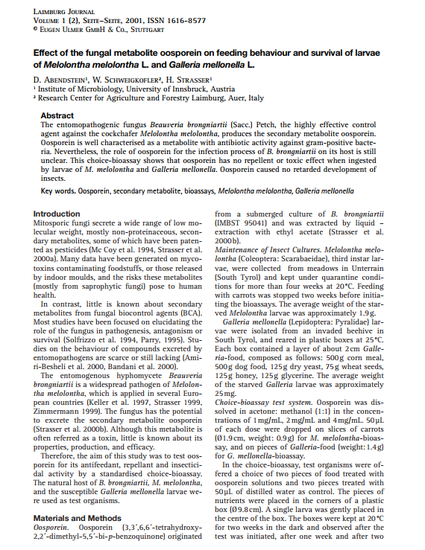
Article
Effect of the fungal metabolite oosporein on feeding behaviour and survival of Melolontha melolontha L.- and Galleria mellonella L.-larvae
Laimburg Journal
(2004)
Abstract
The entomopathogenic fungus Beauveria brongniartii (Sacc.) Petch, the highly effective control agent against the cockchafer Melolontha melolontha, produces the secondary metabolite oosporein. Oosporein is well characterised as a metabolite with antibiotic activity against gram-positive bacteria. Nevertheless, the role of oosporein for the infection process of B. brongniartii on its host is still unclear. This choice-bioassay shows that oosporein has no repellent or toxic effect when ingested by larvae of M. melolontha and Galleria mellonella. Oosporein caused no retarded development of insects.
Keywords
- Oosporein,
- secondary metabolite,
- bioassays,
- Melolontha melolontha,
- Galleria mellonella
Disciplines
Publication Date
2004
Citation Information
D. Abendstein, Wolfgang Schweigkofler and H. Strasser. "Effect of the fungal metabolite oosporein on feeding behaviour and survival of Melolontha melolontha L.- and Galleria mellonella L.-larvae" Laimburg Journal Vol. 1 Iss. 2 (2004) p. 273 - 276 ISSN: 1616-8577 Available at: http://works.bepress.com/wolfgang_schweigkofler/53/
